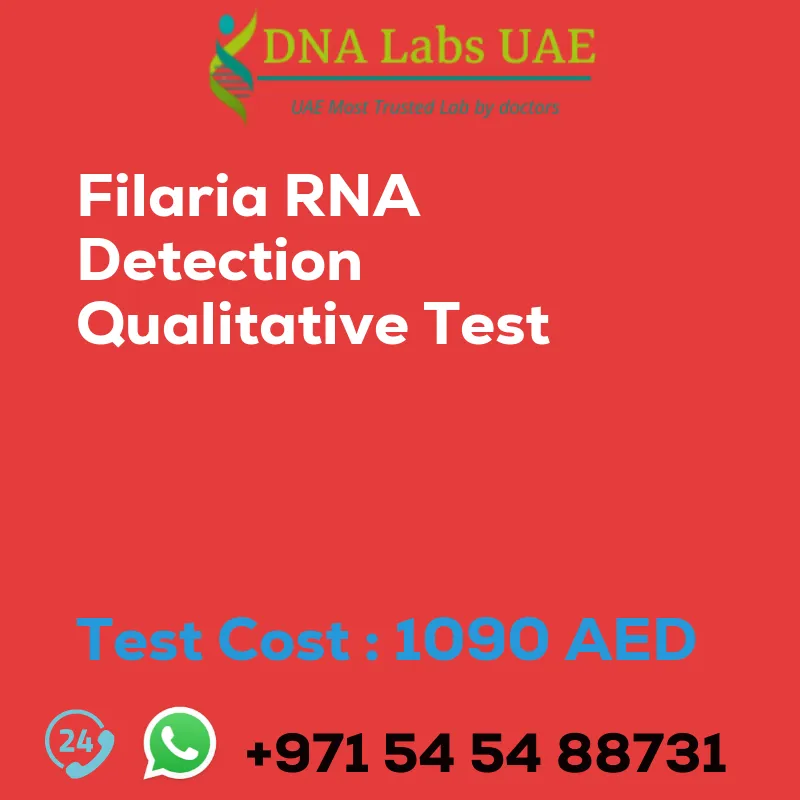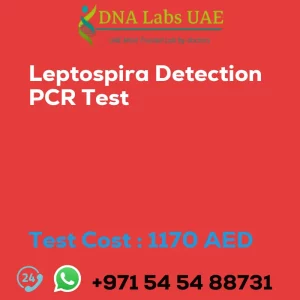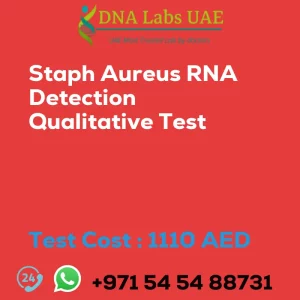Filaria RNA Detection Qualitative Test
Cost: AED 1090.0
Symptoms, Diagnosis, and Test Details
At DNA Labs UAE, we offer the Filaria RNA Detection Qualitative Test, a diagnostic tool used to detect the presence of filarial parasites in a patient’s blood sample. Filarial parasites are responsible for causing diseases such as lymphatic filariasis and onchocerciasis.
This test specifically targets the detection of RNA (ribonucleic acid) molecules that are unique to filarial parasites. RNA is a genetic material that carries the instructions for protein synthesis in cells. By targeting specific RNA sequences, this test can identify the presence of filarial parasites in the patient’s blood.
The test procedure involves collecting a blood sample from the patient, usually through a venipuncture. The collected blood is then processed to isolate the RNA molecules present in the sample. This can be done using various techniques, such as reverse transcription-polymerase chain reaction (RT-PCR) or loop-mediated isothermal amplification (LAMP).
Once the RNA is isolated, it is subjected to amplification and detection using specific primers and probes that target the filarial RNA sequences. If the filarial RNA is present in the sample, it will be amplified, and the presence of the amplified product can be detected using methods like gel electrophoresis, real-time PCR, or colorimetric assays.
A positive result from the filaria RNA detection qualitative test indicates the presence of filarial parasites in the patient’s blood. This information is crucial for diagnosing filarial infections and determining the appropriate treatment options. It is important to note that this test is a qualitative test, meaning it only detects the presence or absence of filarial RNA. It does not provide information about the parasite load or the stage of the infection. Additional tests may be required to obtain such information.
Test Information and Report Delivery
The Filaria RNA Detection Qualitative Test is available at a cost of AED 1090.0. The test can be performed on whole blood samples or biopsies. To undergo the test, patients need to sign a consent document and bring any clinical history of the patient related to filarial infections.
Once the sample is collected, the report will be delivered within 4 working days via email or within 36 hours on phone.
Test Department and Doctor
The Filaria RNA Detection Qualitative Test is conducted in our Genetics department by our experienced physicians.
Conclusion
The Filaria RNA Detection Qualitative Test offered by DNA Labs UAE is a valuable tool in the diagnosis and surveillance of filarial infections. It allows for early detection and prompt treatment, which can help prevent the progression of the disease and its complications.
| Test Name | Filaria RNA Detection Qualitative Test |
|---|---|
| Components | |
| Price | 1090.0 AED |
| Sample Condition | Whole blood., Biopsies |
| Report Delivery | 4th Working Day Email : 48 hours.On phone : 36 hours |
| Method | Real Time PCR |
| Test type | Viral |
| Doctor | Physician |
| Test Department: | Genetics |
| Pre Test Information | Need to sign Consent document and bring any clinical history of patient forFilaria (RNA Detection) QualitativeTest |
| Test Details |
The Filaria RNA detection qualitative test is a diagnostic tool used to detect the presence of filarial parasites in a patient’s blood sample. Filarial parasites are responsible for causing diseases such as lymphatic filariasis and onchocerciasis. This test specifically targets the detection of RNA (ribonucleic acid) molecules that are unique to filarial parasites. RNA is a genetic material that carries the instructions for protein synthesis in cells. By targeting specific RNA sequences, this test can identify the presence of filarial parasites in the patient’s blood. The test procedure involves collecting a blood sample from the patient, usually through a venipuncture. The collected blood is then processed to isolate the RNA molecules present in the sample. This can be done using various techniques, such as reverse transcription-polymerase chain reaction (RT-PCR) or loop-mediated isothermal amplification (LAMP). Once the RNA is isolated, it is subjected to amplification and detection using specific primers and probes that target the filarial RNA sequences. If the filarial RNA is present in the sample, it will be amplified, and the presence of the amplified product can be detected using methods like gel electrophoresis, real-time PCR, or colorimetric assays. A positive result from the filaria RNA detection qualitative test indicates the presence of filarial parasites in the patient’s blood. This information is crucial for diagnosing filarial infections and determining the appropriate treatment options. It is important to note that this test is a qualitative test, meaning it only detects the presence or absence of filarial RNA. It does not provide information about the parasite load or the stage of the infection. Additional tests may be required to obtain such information. Overall, the filaria RNA detection qualitative test is a valuable tool in the diagnosis and surveillance of filarial infections. It allows for early detection and prompt treatment, which can help prevent the progression of the disease and its complications. |








